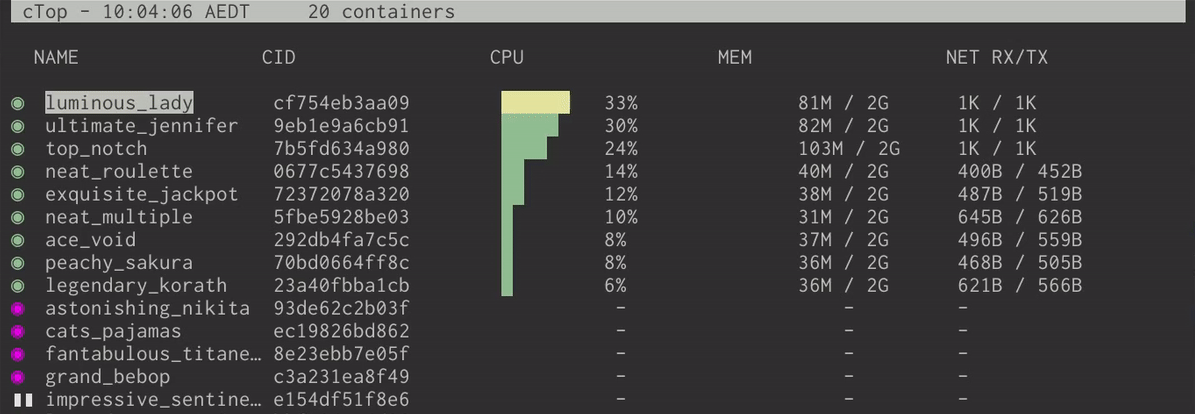1
2
3
4
5
6
7
8
9
10
11
12
13
14
15
16
17
18
19
20
21
22
23
24
25
26
27
28
29
30
31
32
33
34
35
36
37
38
39
40
41
42
43
44
45
46
47
48
49
50
51
52
53
54
55
56
57
58
59
60
61
62
63
64
65
66
67
68
69
70
71
72
73
74
75
76
77
78
79
80
81
82
83
84
85
86
87
88
89
90
91
92
93
94
95
96
97
98
99
100
101
102
103
104
105
106
107
108
109
110
111
112
113
| $ fio fio.conf.file
randread-4k: (g=0): rw=randread, bs=(R) 4096B-4096B, (W) 4096B-4096B, (T) 4096B-4096B, ioengine=libaio, iodepth=128
...
randwrite-4k: (g=1): rw=randwrite, bs=(R) 4096B-4096B, (W) 4096B-4096B, (T) 4096B-4096B, ioengine=libaio, iodepth=128
...
read-512k: (g=2): rw=read, bs=(R) 512KiB-512KiB, (W) 512KiB-512KiB, (T) 512KiB-512KiB, ioengine=libaio, iodepth=128
...
write-512k: (g=3): rw=write, bs=(R) 512KiB-512KiB, (W) 512KiB-512KiB, (T) 512KiB-512KiB, ioengine=libaio, iodepth=128
...
fio-3.19
Starting 128 threads
randread-4k: Laying out IO file (1 file / 5120MiB)
Jobs: 30 (f=30): [_(96),W(12),_(1),W(6),_(1),W(12)][37.3%][w=360MiB/s][w=720 IOPS][eta 13m:30s]
randread-4k: (groupid=0, jobs=32): err= 0: pid=1535608: Thu Nov 18 09:11:15 2021
read: IOPS=11.9k, BW=46.4MiB/s (48.6MB/s)(5564MiB/120025msec)
slat (nsec): min=1534, max=168704k, avg=2694411.30, stdev=4645972.12
clat (msec): min=10, max=1069, avg=342.33, stdev=74.36
lat (msec): min=17, max=1118, avg=345.03, stdev=74.85
clat percentiles (msec):
| 1.00th=[ 107], 5.00th=[ 241], 10.00th=[ 262], 20.00th=[ 288],
| 30.00th=[ 309], 40.00th=[ 321], 50.00th=[ 342], 60.00th=[ 359],
| 70.00th=[ 380], 80.00th=[ 401], 90.00th=[ 430], 95.00th=[ 460],
| 99.00th=[ 531], 99.50th=[ 567], 99.90th=[ 718], 99.95th=[ 776],
| 99.99th=[ 902]
bw ( KiB/s): min=24114, max=117969, per=99.85%, avg=47395.97, stdev=305.48, samples=7648
iops : min= 6026, max=29481, avg=11848.53, stdev=76.36, samples=7648
lat (msec) : 20=0.01%, 50=0.04%, 100=0.89%, 250=5.86%, 500=91.40%
lat (msec) : 750=1.73%, 1000=0.07%, 2000=0.01%
cpu : usr=0.06%, sys=0.27%, ctx=1296227, majf=0, minf=4128
IO depths : 1=0.1%, 2=0.1%, 4=0.1%, 8=0.1%, 16=0.1%, 32=0.1%, >=64=99.9%
submit : 0=0.0%, 4=100.0%, 8=0.0%, 16=0.0%, 32=0.0%, 64=0.0%, >=64=0.0%
complete : 0=0.0%, 4=100.0%, 8=0.0%, 16=0.0%, 32=0.0%, 64=0.0%, >=64=0.1%
issued rwts: total=1424347,0,0,0 short=0,0,0,0 dropped=0,0,0,0
latency : target=0, window=0, percentile=100.00%, depth=128
randwrite-4k: (groupid=1, jobs=32): err= 0: pid=1541968: Thu Nov 18 09:11:15 2021
write: IOPS=11.8k, BW=46.0MiB/s (48.3MB/s)(5527MiB/120027msec); 0 zone resets
slat (nsec): min=1603, max=169727k, avg=2712193.76, stdev=4974963.08
clat (usec): min=501, max=921119, avg=344609.13, stdev=67128.86
lat (usec): min=504, max=929592, avg=347321.59, stdev=67565.75
clat percentiles (msec):
| 1.00th=[ 178], 5.00th=[ 249], 10.00th=[ 271], 20.00th=[ 292],
| 30.00th=[ 309], 40.00th=[ 330], 50.00th=[ 342], 60.00th=[ 359],
| 70.00th=[ 380], 80.00th=[ 401], 90.00th=[ 430], 95.00th=[ 451],
| 99.00th=[ 510], 99.50th=[ 542], 99.90th=[ 676], 99.95th=[ 751],
| 99.99th=[ 852]
bw ( KiB/s): min=25024, max=86996, per=99.89%, avg=47100.88, stdev=261.59, samples=7648
iops : min= 6255, max=21748, avg=11775.01, stdev=65.40, samples=7648
lat (usec) : 750=0.01%
lat (msec) : 2=0.01%, 4=0.01%, 10=0.01%, 20=0.01%, 50=0.09%
lat (msec) : 100=0.23%, 250=4.98%, 500=93.49%, 750=1.14%, 1000=0.05%
cpu : usr=0.07%, sys=0.28%, ctx=1285046, majf=0, minf=32
IO depths : 1=0.1%, 2=0.1%, 4=0.1%, 8=0.1%, 16=0.1%, 32=0.1%, >=64=99.9%
submit : 0=0.0%, 4=100.0%, 8=0.0%, 16=0.0%, 32=0.0%, 64=0.0%, >=64=0.0%
complete : 0=0.0%, 4=100.0%, 8=0.0%, 16=0.0%, 32=0.0%, 64=0.0%, >=64=0.1%
issued rwts: total=0,1414991,0,0 short=0,0,0,0 dropped=0,0,0,0
latency : target=0, window=0, percentile=100.00%, depth=128
read-512k: (groupid=2, jobs=32): err= 0: pid=1548302: Thu Nov 18 09:11:15 2021
read: IOPS=443, BW=222MiB/s (233MB/s)(26.1GiB/120317msec)
slat (usec): min=9, max=930894, avg=71954.82, stdev=63916.45
clat (msec): min=121, max=13298, avg=8889.65, stdev=1711.42
lat (msec): min=259, max=13401, avg=8961.61, stdev=1714.61
clat percentiles (msec):
| 1.00th=[ 1401], 5.00th=[ 6141], 10.00th=[ 7483], 20.00th=[ 8154],
| 30.00th=[ 8490], 40.00th=[ 8792], 50.00th=[ 9060], 60.00th=[ 9329],
| 70.00th=[ 9597], 80.00th=[10000], 90.00th=[10537], 95.00th=[11073],
| 99.00th=[11745], 99.50th=[12013], 99.90th=[12818], 99.95th=[12953],
| 99.99th=[13221]
bw ( KiB/s): min=35829, max=499679, per=99.12%, avg=225160.35, stdev=2695.71, samples=7169
iops : min= 67, max= 975, avg=438.92, stdev= 5.27, samples=7169
lat (msec) : 250=0.03%, 500=0.21%, 750=0.22%, 1000=0.19%, 2000=0.84%
lat (msec) : >=2000=98.51%
cpu : usr=0.01%, sys=0.07%, ctx=121043, majf=0, minf=524320
IO depths : 1=0.1%, 2=0.1%, 4=0.2%, 8=0.5%, 16=1.0%, 32=1.9%, >=64=96.2%
submit : 0=0.0%, 4=100.0%, 8=0.0%, 16=0.0%, 32=0.0%, 64=0.0%, >=64=0.0%
complete : 0=0.0%, 4=99.9%, 8=0.0%, 16=0.0%, 32=0.0%, 64=0.0%, >=64=0.1%
issued rwts: total=53381,0,0,0 short=0,0,0,0 dropped=0,0,0,0
latency : target=0, window=0, percentile=100.00%, depth=128
write-512k: (groupid=3, jobs=32): err= 0: pid=1550227: Thu Nov 18 09:11:15 2021
write: IOPS=442, BW=221MiB/s (232MB/s)(26.0GiB/120384msec); 0 zone resets
slat (usec): min=16, max=1135.3k, avg=72030.60, stdev=59737.86
clat (msec): min=79, max=14388, avg=8853.39, stdev=1881.03
lat (msec): min=79, max=14496, avg=8925.42, stdev=1887.27
clat percentiles (msec):
| 1.00th=[ 1003], 5.00th=[ 5537], 10.00th=[ 7416], 20.00th=[ 8020],
| 30.00th=[ 8423], 40.00th=[ 8792], 50.00th=[ 9060], 60.00th=[ 9329],
| 70.00th=[ 9597], 80.00th=[10000], 90.00th=[10671], 95.00th=[11208],
| 99.00th=[13221], 99.50th=[13624], 99.90th=[14160], 99.95th=[14160],
| 99.99th=[14295]
bw ( KiB/s): min=40950, max=624837, per=99.90%, avg=226555.80, stdev=2902.55, samples=7107
iops : min= 78, max= 1219, avg=441.72, stdev= 5.67, samples=7107
lat (msec) : 100=0.05%, 250=0.16%, 500=0.33%, 750=0.25%, 1000=0.22%
lat (msec) : 2000=0.84%, >=2000=98.16%
cpu : usr=0.06%, sys=0.05%, ctx=122810, majf=0, minf=32
IO depths : 1=0.1%, 2=0.1%, 4=0.2%, 8=0.5%, 16=1.0%, 32=1.9%, >=64=96.2%
submit : 0=0.0%, 4=100.0%, 8=0.0%, 16=0.0%, 32=0.0%, 64=0.0%, >=64=0.0%
complete : 0=0.0%, 4=99.9%, 8=0.0%, 16=0.0%, 32=0.0%, 64=0.0%, >=64=0.1%
issued rwts: total=0,53322,0,0 short=0,0,0,0 dropped=0,0,0,0
latency : target=0, window=0, percentile=100.00%, depth=128
Run status group 0 (all jobs):
READ: bw=46.4MiB/s (48.6MB/s), 46.4MiB/s-46.4MiB/s (48.6MB/s-48.6MB/s), io=5564MiB (5834MB), run=120025-120025msec
Run status group 1 (all jobs):
WRITE: bw=46.0MiB/s (48.3MB/s), 46.0MiB/s-46.0MiB/s (48.3MB/s-48.3MB/s), io=5527MiB (5796MB), run=120027-120027msec
Run status group 2 (all jobs):
READ: bw=222MiB/s (233MB/s), 222MiB/s-222MiB/s (233MB/s-233MB/s), io=26.1GiB (27.0GB), run=120317-120317msec
Run status group 3 (all jobs):
WRITE: bw=221MiB/s (232MB/s), 221MiB/s-221MiB/s (232MB/s-232MB/s), io=26.0GiB (27.0GB), run=120384-120384msec
Disk stats (read/write):
vda: ios=1560424/1561420, merge=620/2869, ticks=60567966/61121545, in_queue=121689511, util=99.22%
|
